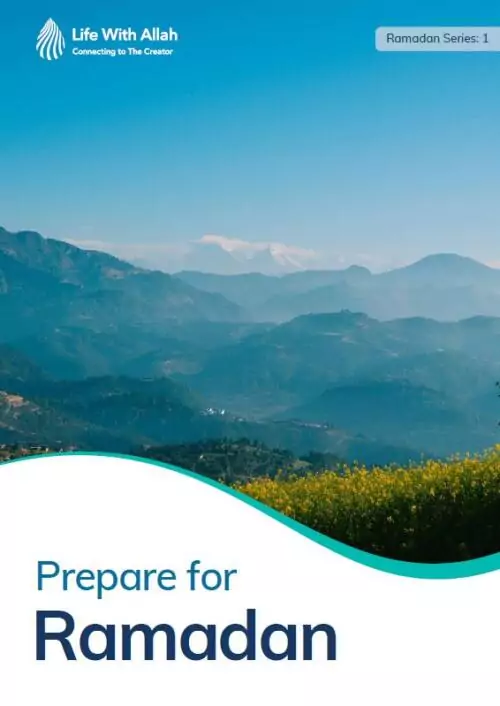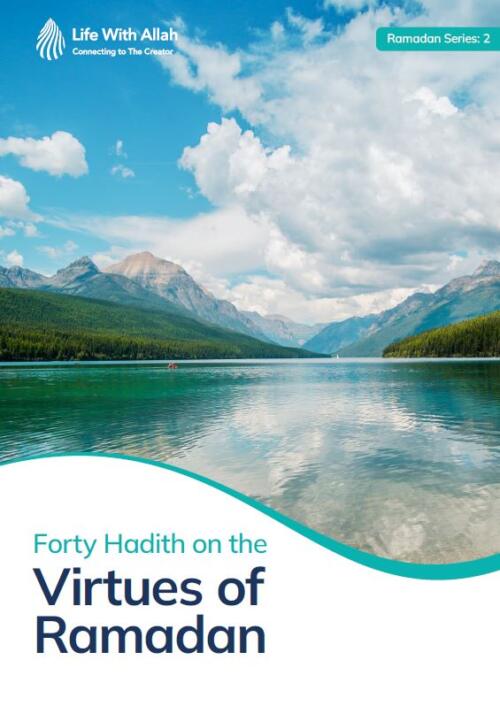1. Enjoy the ‘Outpourings’ of Allah’s mercy
The Messenger of Allah ﷺ said: “Do good all the time, and seek to be recipients of the ‘outpouring’ of Allah’s mercy. Indeed, Allah showers down these (special) ‘outpourings’ of His mercy to whomsoever He wills from His slaves.” (Ṭabarānī 719)
Although Allah constantly showers His mercy, love and blessings upon us throughout the year, there are certain times of the year wherein He is even more Generous to us.
These are the special seasons, days and moments in which it is even easier to acquire His pleasure, earn His forgiveness and be saved from the Hell-fire. The blessed month of Ramaḍān is one such season when we witness the fruits of Allah’s love and kindness.
2. Ramadan Mubarak: Gates of Heaven & Hell
The Messenger of Allah ﷺ said: “The month of Ramaḍān has come to you, a blessed month in which Allah – Exalted and Majestic is He – has obligated (its) fasting upon you. In it the gates of Paradise are opened, the gates of Hell-fire are closed, and the rebellious devils are chained. In it, Allah has a night which is better than a thousand months. Whoever is deprived of its good is truly deprived!” (Nasā’ī 2106)
“Some of the scholars said: ‘This ḥadīth is the basis for congratulating one another for the arrival of Ramaḍān. Why shouldn’t the believer be congratulated when the gates of Paradise have opened? Why shouldn’t the sinner be congratulated when the gates of the Hell-fire have closed? Why shouldn’t the intelligent be congratulated for a time when the devils are chained? How can this time be compared to any other time?’” (Ibn Rajab)
3. ‘O seeker of good, come forward! O seeker of evil, stop!’
The Messenger of Allah ﷺ said: “When it is the first night of the month of Ramadān, the devils and the rebellious jinn are tied up; the doors of Hell-fire are closed, and none of its doors are opened. The doors of Paradise are opened, and none of its doors are closed. A caller calls out: ‘O seeker of good, come forward! O seeker of evil, stop!’ And every night, Allah frees slaves from the Hell-fire.” (Tirmidhī 682)
‘By Allah, if it was said to the people of the grave, ‘make a wish!’ they would wish for one day of Ramaḍān.’ (Ibn al-Jawzī)
Ramaḍān is short, so let us not shorten it further with our negligence. Use it wisely
4. Be Forgiven From Ramadan to Ramadan
The Messenger of Allah ﷺ said: “The five daily prayers, Jumuʿah to Jumuʿah, and Ramaḍān to Ramaḍān expiate for (the sins perpetrated) in between them, so long as one stays away from the major sins.” (Muslim 233c)
“Whoever’s Jumuʿah is safe from evil, his week will be safe from evil. Whoever’s Ramaḍān is safe from evil, his year will be safe from evil. Whoever’s ḥajj is safe from evil, his life will be safe from evil.” (Ibn al-Qayyim)
5. Know This is The Month of Qur’an
Ramaḍān is the month for reciting the Qur’ān. Allah says:
شَهْرُ رَمَضَانَ ٱلَّذِىٓ أُنزِلَ فِيهِ ٱلْقُرْءَانُ هُدًى لِّلنَّاسِ وَبَيِّنَـٰتٍ مِّنَ ٱلْهُدَىٰ وَٱلْفُرْقَانِ
“Ramaḍān is the month in which the Qur’ān was revealed – a guidance for mankind, and clear proofs of the guidance, and the criterion (between right and wrong)…” (2:185)
The Messenger of Allah ﷺ said: “The scriptures of Ibrāhīm were revealed on the first night of Ramaḍān. The Torah was revealed after six nights of Ramaḍān had passed. The Gospel was revealed after thirteen nights of Ramaḍān had passed. The Qur’ān was revealed after twenty-four nights of Ramaḍān had passed.” (Aḥmad 16984)
6. Realise The Purpose of Fasting
يا أيُّها الَّذِينَ آمَنُوا كُتِبَ عَلَيْكُمُ الصِّيامُ كَما كُتِبَ عَلى الَّذِينَ مِن قَبْلِكُمْ لَعَلَّكُمْ تَتَّقُونَ
“…Fasting is prescribed for you, as it was prescribed for those before you, so that you may attain taqwā (piety and mindfulness of Allah).” (2:183)
Taqwā is to protect yourself from the punishment of Allah by avoiding His prohibitions and implementing His commands.
When we fast, we temporarily make harām on ourselves what is usually halāl (eating, drinking etc). This teaches us to say ‘NO!’ to our nafs and inner desires. This helps our taqwā to grow, making it easier to restrain ourselves from harām throughout the year.
7. Know that Allah Wants Ease For You
أَيَّامًا مَّعْدُودَاتٍ
“(fast for) a limited number of days…” (2:184)
Fasting is obligatory upon us only for a limited number of days (29/30 days). From His mercy, Allah made this amount manageable and easy for us. Furthermore, He made this short amount of time a source of immense blessings.
Ḥafṣah b. Sīrīn quoted Abūl-ʿĀliyah as saying, “The fasting person is in a state of worship so long as he does not backbite anyone, even if he is sleeping in his bed.” Then Ḥafṣah would say, “How wonderful it is that I am in a state of worship whilst I am sleeping on my bed.”
8. Fasting: A Unique Reward
The Messenger of Allah ﷺ said: “Every action of the son of Ādam is multiplied: a good deed receiving a tenfold to seven hundredfold reward. Allah the Mighty and Exalted has said: ‘Except for fasting. It is for Me and I will (personally) reward it; he abandons his desires and food for My sake.’ The fasting person will have two moments of joy: one when he opens his fast, and the other when he will meet his Lord. The unpleasant smell coming out of his mouth is more fragrant to Allah than musk.” (Muslim 1151)
The Messenger of Allah ﷺ quoting Prophet Yaḥyā (ʿalayhis-salām) said: “And I command you to fast. Indeed, the similitude of (fasting) is a man carrying a pouch of musk in a crowd of people, all of them marvelling at its fragrance. Indeed, the breath of the fasting person is more fragrant to Allah than the scent of musk” (Tirmidhī 2863)
Ibn al-Qayyim (raḥimahullāh) explains that in this ḥadīth, the Prophet ﷺ used the image of someone carrying a pouch of musk concealed from view, hidden under his garments, as was the habit of those who carry musk. Fasting is, likewise, hidden from the eyes of men and unperceived by their senses. This is one reason why it has been described in another ḥadīth as an action which is exclusively for Allah.
9. Rayyan: A Gate of Paradise
The Messenger of Allah ﷺ said: “Indeed, there is a gate in Paradise called al-Rayyān. Those who fasted will enter through it on the Day of Judgement. No one else will enter through it along with them. It will be said: ‘Where are those who fasted?’ Then they will get up, and there will be none other than them to enter through it. Once they have all entered, it will be closed and no one else will enter through it.” (Bukhārī 1896)
10. Fasting is a Shield
The Messenger of Allah ﷺ said: “Fasting is a shield from the Hell-fire.” (Tirmidhī 764)
11. Whose Fasts are the Best?
A man asked the Messenger of Allah ﷺ: “Which warriors are the best?” He ﷺ replied: “Those who remember Allah the most.” The man asked: “Which of those who fast are the best?” He ﷺ replied: “Those who remember Allah the most.”
Then the man mentioned ṣalāh, zakāh and ḥajj, and each time the Messenger of Allah ﷺ replied: “Those who remember Allah the most.” Abū Bakr (raḍiy Allāhu ʿanhu) said to ʿUmar (raḍiy Allāhu ʿanhu): “Those who remember (Allah) have taken all the good,” at which the Messenger of Allah ﷺ remarked: “Yes, indeed!” (Aḥmad 15553)
12. Have Iftar Early
The Messenger of Allah ﷺ said: “The people will remain well as long as they hasten the opening of the fast.” (Bukhārī 1957)
13. Open Your Fast With Dates
Anas b. Mālik (raḍiy Allāhu ʿanhu) said: “The Prophet ﷺ used to open his fast before performing ṣalāh with some fresh dates. If there were not any fresh dates, then with some dry dates. And if there were no dry dates, then he would drink a few sips of water.” (Aḥmad 12676)
14. Know What to Recite after Opening Your Fast
ʿAbdullāh b. ʿUmar (radiy Allāhu ʿanhumā) said: “When the Prophet ﷺ would open his fast, he would say:
ذَهَبَ الظَّمَأُ ، وَابْتَلَّتِ الْعُرُوْقُ ، وَثَبَتَ الْأَجْرُ إِنْ شَاءَ اللهُ
The thirst has gone, the veins have been moistened, and the reward has been secured, if Allah wills.” (Abū Dāwūd 2357)
15. Feed a Fasting Person
The Messenger of Allah ﷺ said: “Whoever provides iftār for a fasting person, he will have the same reward as him, without anything being diminished from the reward of the fasting person.” (Tirmidhī 807)
16. Get Your Du‘a Accepted
The Messenger of Allah ﷺ said: “There are three whose duʿā’ is not rejected: the fasting person until he opens his fast, the just leader, and the supplication of the oppressed person…” (Tirmidhī 3598)
17. Make Du‘a’ Before Iftar
The Messenger of Allah ﷺ said: “Indeed, the fasting person has a supplication at the time of his Iftār which is not rejected.” (Ibn Mājah 1825)
Ibn Abī Mulaykah (raḥimahullāh) said: I heard ʿAbdullāh b. ʿAmr say upon opening his fast,
اللَّهُمَّ إِنِّي أَسْأَلُكَ بِرَحْمَتِكَ الَّتِي وَسِعَتْ كُلَّ شَىْءٍ أَنْ تَغْفِرَ لِي
O Allah, I beg You – through Your mercy which encompasses everything – to forgive me. (Ibn Mājah 1825)
18. Enjoy the Blessings of Suhur
The Messenger of Allah ﷺ said: “Eat suḥūr, for indeed there is blessing in it.” (Bukhārī 1923)
Suḥūr is blessed because:
- you are following the Sunnah
- you are distinguishing yourself from the People of the Book
- it gives you strength to worship Allah
- it increases your energy
- it wards off a bad attitude and poor character that may arise from hunger
- it allows you to give charity to anyone who asks for it at that time
- it allows you to share your meal at this time with the needy
- it leads you to remember Allah and supplicate to Him at a time when it is likely to be accepted
- it allows you to make an intention of fasting if you had forgotten to do so before sleeping.
(Adapted from Ibn Ḥajar (raḥimahullāh))
19. Eat Dates for Suhur
The Messenger of Allah ﷺ said: “How excellent are dates as the believer’s suhūr.” (Abū Dāwūd 2345)
20. Do You Want Allah to Bless You?
The Messenger of Allah ﷺ said: “There is blessing in eating suḥūr; so, do not skip it, even if one of you has a sip of water. For indeed Allah and His Angels send blessings and mercy on those who eat suhūr.” (Aḥmad 11086)
21. Purify Your Fast From Foul Language
The Messenger of Allah ﷺ said: “When one of you wakes up fasting, he should neither use obscene language nor act ignorantly. If anyone insults him or argues with him, he should say: ‘I am fasting, I am fasting.’” (Muslim 1151)
“Let there be an aura of tranquility and dignity on the day of your fast. And don’t make the day when you fast the same as the day you don’t fast.” (Jābir b. Abdillāh radiy Allāhu ʿanhumā)
22. Protect Your Fast
The Messenger of Allah ﷺ said: “Whoever does not give up lying and false conduct, Allah has no need in him giving up his food and his drink.” (Bukhārī 1903)
“A man fasts from the pure and lawful, but he breaks his fast with the evil and unlawful: the flesh of his brother (i.e. ruins his fast by backbiting his brother).” (Yāḥyā b. Abī Kathīr)
23. Safeguard Your Fasting & Qiyam
The Messenger of Allah ﷺ said: “There are many who fast, who gain nothing of their fast except hunger; and there are many who stand for the night prayer, who gain nothing of their prayer except sleeplessness.” (Ibn Mājah 1690)
24. Purify Your Heart by Fasting
The Messenger of Allah ﷺ said: “Fasting the Month of patience (i.e. Ramaḍān) and three days of every month remove the ‘evil traits’ (waḥar) of the heart.” (Aḥmad 7577)
Waḥar includes hatred, anger, hypocrisy, hardheartedness, and the whispers of shayṭān.
25. Fast Ramadan with Iman & Sincerity
The Messenger of Allah ﷺ said: “Whoever observes the fasts of Ramaḍān with firm belief and hoping for reward, all his previous sins will be forgiven.” (Bukhārī 2014)
26. Fasting: Half of Sabr
The Messenger of Allah ﷺ said: “Fasting is half of ṣabr.” (Tirmidhī 3519)
The reward of ṣabr is unique. Allah informs us:
إِنَّمَا يُوَفَّى الصَّـٰبِرُوْنَ أَجْرَهُمْ بِغَيْرِ حِسَابٍ
“Certainly, those who observe patience will be given their reward in full without measure.” (39:10)
Like fasting, the reward of ṣabr has been left unspecified. It has been kept a surprise. This is because it is a difficult quality to attain. To persevere and not give up, to endure life’s difficulties without complaint and to continue struggling against all the odds is a trait of the great. It is as Allah described, one of the “matters that require strong resolve” (31:17)
27. Know the Reward of Qiyam with the Imam
The Messenger of Allah ﷺ said: “Whoever performs qiyām (night prayer) with the imām until he finishes, Allah will record the qiyām of the (entire) night for him.” (Nasā’ī 1605)
Will Allah Smile at You Tonight?
The Messenger of Allah ﷺ said: “There are three people whom Allah loves, is delighted with and smiles at. [Of them is] a man who has a beautiful wife, and a comfortable bed. He then gets up to pray (at night), so Allah says to His Angels, “My Angels, look! This is My servant. He has a comfortable bed and a beautiful wife, but he left them both. He then stood to pray, humbly begging Me, reciting My verses. And if he wished, he could have slept.” (Hākim)
28. Pray Qiyam with Iman & Sincerity
The Messenger of Allah ﷺ said: “Whoever stands in prayer at night (qiyām) in the month of Ramaḍān with firm belief and hoping for reward, all his previous sins will be forgiven.” (Bukhārī 2014)
By Allah, if it wasn’t for the night prayer (qiyām al-layl), I would not have loved the world. By Allah, the people of the night (prayer) experience more delight in their night than the people of entertainment experience in their entertainment. Sometimes the hearts experience moments in which they leap out of joy due to the remembrance of Allah, to the extent that I say: ‘If the people of Paradise have anything like this, then how blissful must their lives be!’ (Abū Sulaymān al-Dārānī)
Be from those who are pleased with Ramaḍān and are eager to strive in it. Show Allah how happy you are with His special month through your intention, worship and desire for reward. Be not from those who become miserable with Ramaḍān’s arrival and feel ‘forced’ to fast its days.
29. Be Generous Like the Prophet in Ramadan
ʿAbdullāh b. ʿAbbās (radiy Allāhu ʿanhumā) said: “The Messenger of Allah ﷺ was the most generous of all people; and he was the most generous during the month of Ramaḍān when Jibrīl would meet him. Jibrīl would meet him every night in Ramaḍān to study the Qur’ān with him ﷺ. When Jibrīl would meet him, the Messenger of Allah would be more generous than strong winds (which cause rain and prosperity).” (Bukhārī 3220)
This ḥadīth illustrates the desirability of studying the Qur’ān in Ramaḍān and gathering together for this sake; along with reviewing it with someone who is more well-versed in it. It also proves the desirability of reciting Qur’ān abundantly in the month of Ramaḍān. Similarly, the Prophet ﷺ studied with Jibrīl at night. This shows the desirability of reciting Qur’ān at night, as distractions are cut off, one is able to focus solely on the Qur’ān; and the tongue can concur with the heart in reflecting upon the Qur’ān, as Allah says, ‘Indeed, rising by night (for prayer) makes for a stronger impression (on the soul), and is best for the recitation (of Allah’s words).’ (73:6) (Ibn Rajab)
30. Umrah In Ramadan = Hajj with the Prophet ﷺ
The Messenger of Allah ﷺ said: “…Inform her that (performing ʿumrah in Ramaḍān) is equivalent to performing ḥajj with me.” (Abū Dāwūd 1990)
31. Will You Be of Those Freed Tonight?
The Messenger of Allah ﷺ said: “Indeed Allah has freed slaves (from Hell) every day and night. Every slave from them has an accepted supplication.” (Aḥmad 7450)
اللهم أَعْتِقْ رِقَابَنَا مِنَ النَّارِ
O Allah, free us from the Hell-fire.
32. Strive to be like the Prophet ﷺ in the last 10 Days
ʿĀ’ishah (raḍiy Allāhu ʿanhā) said: “The Messenger of Allah ﷺ would combine both prayer and sleep (at night) during the first 20 (days of Ramadān). But when the last ten days arrived, he would exert himself in worship and stay away from his wives.” (Aḥmad 25136)
ʿĀ’ishah (raḍiy Allāhu ʿanhā) said: “When the last ten days of Ramadān arrived, the Prophet ﷺ would tighten his waist belt (stay away from his wives/strive hard), spend the night in worship, and awaken his family.” (Bukhārī 2024)
33. Perform I’tikaf (Seclusion in the Masjid) in the Month of Ramadan
The Messenger of Allah ﷺ used to observe iʿtikāf during the last ten days of Ramaḍān. (Bukhārī 2025)
34. Seek a Chance to Be Amongst the Siddiqin & Martyrs
A man came to the Prophet ﷺ and said: “O Messenger of Allah, if I testify that there is no god worthy of worship except Allah, and that you are the Messenger of Allah, I pray the five prayers, I give zakāh, I fast Ramaḍān and I stand in prayer during its nights; then who do you think I am from?” He ﷺ said: “From the Ṣiddīqīn and the martyrs.” (Ibn Ḥibbān 3438)
The Ṣiddīqīn are those who have attained the highest status of īmān, conviction and truthfulness. Even in difficult times, their actions consistently verify their words. Examples of such people include the best of the Prophets’ followers, such as Abū Bakr al-Ṣiddīq (raḍiy Allāhu ʿanhu).
35. Know Fasting & Qiyam Will Intercede For You
The Messenger of Allah ﷺ said: “Fasting and the Qur’ān will intercede for the servant on the Day of Judgement. Fasting will say: My Lord, I prevented him from eating and his desires during the day, so accept my intercession on his behalf. The Qur’ān will say: I prevented him from sleeping at night, so accept my intercession on his behalf. Then, both of their intercession will be accepted.” (Aḥmad 6626)
The Messenger of Allah ﷺ said: “Indeed in Paradise, there are chambers, the outsides of which can be seen from their insides and their insides can be seen from their outsides.” A Bedouin stood up and said, “Who are they for O Messenger of Allah?” He ﷺ said, “For those who speak good, feed others, consistently fast, and stand in prayer at night for Allah, whilst the people are asleep.” (Tirmidhi 2112)
Ibn Rajab (raḥimahullāh) wrote, “All of these actions occur in Ramaḍān: a believer combines fasting, standing in prayer at night, giving charity and speaking good – since the fasting person has been prohibited from obscene and useless chatter.”
36. Seek Out Laylat al-Qadr
The Messenger of Allah ﷺ said: “Seek out Laylat al-Qadr in the odd nights of the last ten (days) of Ramaḍān.” (Bukhārī 2017)
Abū Bakrah (raḍiy Allāhu ʿanhu) said regarding Laylat al-Qadr, “I am not searching for it except in the last ten nights only after something which I heard the Messenger of Allah ﷺ say. He ﷺ said: ‘Search for it (Laylat al-Qadr) in the last ten nights: the 21st, 23rd, 25th, 27th or the last night’” (Aḥmad 20404).
37. In Blessed Company
The Messenger of Allah ﷺ said: “Indeed there are more angels on the earth on that night (Laylat al-Qadr) than the number of pebbles (on the earth).” (Ibn Khuzaymah 2194)
38. Pray Qiyam on Laylat al-Qadr
The Messenger of Allah ﷺ said: “Whoever stands in prayer at night (qiyām) in the Night of Decree (laylat al-qadr) with īmān and hoping for reward, all his previous sins will be forgiven.” (Bukhārī 2014)
Allah, al-ʿAẓīm (The Magnificent), says:
إِنَّآ أَنْزَلْنَـٰهُ فِيْ لَيْلَةِ الْقَدْرِ ( 1) وَمَآ أَدْرَىٰكَ مَا لَيْلَةُ الْقَدْرِ (2) لَيْلَةُ الْقَدْرِ خَيْرٌ مِّنْ أَلْفِ شَهْرٍۢ (3) تَنَزَّلُ الْمَلَـٰٓئِكَةُ وَالرُّوْحُ فِيْهَا بِإِذْنِ رَبِّهِمْ مِّنْ كُلِّ أَمْرٍۢ (4) سَلَـٰمٌ هِىَ حَتَّىٰ مَطْلَعِ الْفَجْرِ (5)
Indeed, We sent this (Qur’ān) down on the Night of Decree and Glory. And what will make you realise what the Night of Decree and Glory is? The Night of Decree and Glory is better than a thousand months. The angels and the Spirit (Jibrīl) descend in it, by the permission of their Lord, for every matter. It is Peace — until the rising of the dawn. (97:1-5)
‘The angels descend in abundance during this night due to its abundant blessings. The angels descend with blessings and mercy, just as they descend when the Qur’ān is recited and surround the gatherings of dhikr.’ (Ibn Kathīr)
Catch this night and it will be as though you’ve worshipped Allah for 1,000+ months!
O you who has wasted his life! There is nothing that will make up for all those years lost except for the Night of al-Qadr, for indeed it is equivalent to a lifetime. (Ibn Rajab)
39. Pray the Du‘a of Laylat al-Qadr
ʿĀ’ishah (raḍiy Allāhu ʿanhā) asked the Messenger of Allah ﷺ: “If I know which night is the Night of Decree, what do you think I should say during it?” He ﷺ replied:
اَللّٰهُمَّ إِنَّكَ عَفُوٌّ تُحِبُّ الْعَفْوَ فَاعْفُ عَنِّيْ
O Allah, You are the Ever-Pardoning, You love to pardon so pardon me. (Tirmidhī 3513)
العفو= The Ever-Pardoning
Al-ʿAfuww is the one who wipes away sins and forgives our shortcomings. Whilst Allah’s Name ‘al-Ghafūr’ also means The Forgiving, al-ʿAfuww is more than that. Al-ʿAfuww is the one who completely removes all traces and consequences of our sins. He wipes them away from the records of the angels: He will not hold us to account for them on the Day of Judgement, nor will He remind us of them to make us feel guilty.
This is why we ask Him in this duʿā’ with His Name ‘al-ʿAfuww’ to forgive us and fully wipe our slates clean.
40. Don’t let Ramadan End Without Being Forgiven
The Messenger of Allah ﷺ said: “…May his nose be soiled in dust! (i.e. may he be humiliated) – the man upon whom Ramaḍān enters, and then ends before he is forgiven!” (Tirmidhī 3545)
‘Abdullāh b. Mas‘ūd (radiy Allāhu ʿanhumā) would say in the last night of Ramadān: “Who among us has been accepted, so that we might congratulate them? And who among us has been deprived of acceptance, so that we might console them?” O accepted one! Congratulations to you! And O rejected one! May Allah remedy that which has befallen you!
‘Istighfār (seeking forgiveness) is the seal of all righteous acts: Ṣalāh, Ḥajj, and Qiyām al-Layl are concluded with it, and gatherings are concluded with it… Likewise it is necessary that one’s Ramaḍān fasting be concluded with istighfār.’ (Ibn Rajab)








